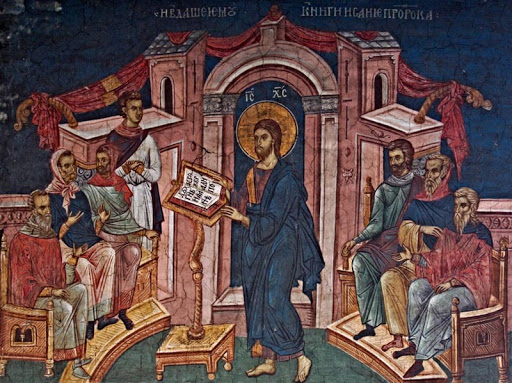See I am sending you out like lambs into the midst of wolves (Lk. 10:3). ⧾
The commission of the seventy disciples to go and to prepare for Our Lord’s own coming is a commission that continues through the ages. We too are likewise sent by virtue of our Confirmation; and at the end of every Mass this commission is renewed: Go forth in peace. We are sent out to work for the salvation of the world, the salvation of souls. Our long and varied history chronicles successes and failures in this regard. Our long history has also witnessed to what is referred to as Christendom: the political, economic, moral, social [and] legal life of a nation as inspired by the gospel ethic (Archbishop Fulton Sheen, 1974). Our own nation, at least in its origin, was once thus governed. Some fifty years ago, Archbishop Sheen observed: I believe that we are now at the end of Christendom, but not of Christianity….And I believe the sooner we face up to this fact, the sooner we will be able to solve many of our problems….We live in a world that challenges us. And many fall away….These are the times in which we live. They are therefore wonderful days; marvelous; we should thank God that we live in times like this. These last sentiments are those of a saint. Nevertheless, even for those of us who may be more faint of heart, these words are nonetheless true. We must never waver from a spirit of thankfulness and of hope.
In the two generations since this assessment was made, the changes that we have experienced especially in regard to the moral, social and legal life of our nation can only be described as exponentially tragic; but this world is our battleground and into we are sent like lambs into the midst of wolves. Yet as the Prophet Isaiah assures us, the hand of the Lord is with his servants (66:14). Though the forces of the world are now at war with nature itself, for the very nature and purpose of the human person is now also the battleground, we must not lose heart and we must keep in mind the reassuring words of Our Lord: See, I have given you authority to tread on snakes and scorpions, and over all the power of the enemy; and nothing will hurt you (Lk. 10:19).
St Paul the Apostle rightly observed that our struggle is against the principalities, against the powers, against the world rulers of this present darkness, against the spiritual hosts of wickedness, in the heavenly places (Eph. 6:12). Against these what is needed is the whole armor of God: truth, the breastplate of righteousness, the equipment of the gospel of peace, the shield of faith, the helmet of salvation, the sword of the Spirit, which is the word of God and prayer and supplication (Cf. Eph. 6:13-20). These are the arms that were used against the cruelty of pagan Rome, the violent superstition of Barbarians, the dehumanizing limits of rationalism, and the cruel tyranny of Fascism and Communism. Now we must use these same arms against the dictatorship of relativism, the indifference of a materialistic culture of death, against the increasingly heartless overreach of the government and sadly, the silence of our shepherds in the face of the moral violence inflicted upon the flock by scandal and heresy. Ours is a world where the charity of the Church has been replaced by the brutality of the state; and our apostasy generally speaking, has facilitated this transition. Our reckless spirit of rebellion has rendered most people both unbelieving and unthinking, a toxic mix. The traditional Catholic faith alone and nothing else can restore a sense of piety, reverence and humility to a world that wages war on the very idea of the sacred; refusing in its pride to acknowledge that there might exist any belief, institution, or code of conduct not subject to human revision.
Nevertheless, in the struggle that is ours in our time and in our day, it is imperative that we rediscover a sense of the sacred, for this alone will bring about the restoration of society and the renewal of the Church. The auto-demolition of the Church of which Pope Paul VI spoke so poignantly appears to proceed at breakneck speed; but we are not without resources. I share with you as I did yesterday some thoughts from a profound spiritual text that has its origin in our own nation. In the Sitio – I thirst, a written expression of the spirituality that she lived and which continues in the Church through the Institute of the Sisters Adorers of the Most Precious Blood – the first contemplative community founded in our country, Venerable Catherine Aurelia of the Precious Blood wrote these words which may serve us in this confused and confusing time: God wishes reparation to be made for the profanation of His Blood. He wants all people to be saved. He invites us, He urges us, He commands us to labour at the work of reparation …Urged on by love, we have to steal away from the cold secular atmosphere. Though written for her spiritual daughters and for a very specific context, her counsel is worth heeding. This is not an escape from reality but a necessary plan of action if we wish to overcome these evil times and the evil men who now govern us.
I encourage you to take home a copy of this spiritual text. Meditate upon it during this month dedicated to Our Lord’s Most Precious Blood and seek to establish in your homes which for those of you with children must be a school for the Lord’s service, a cloister of sorts where you can shield yourselves and your loved ones from the evil that has now been institutionalized. In this all of us can help one another by establishing deep bonds of communion in faith and in charity.
The Sacrament of Charity that binds us together and that we devoutly celebrate and receive each Sunday is our point of departure and our point of return; our source and summit. In practical terms, it means that we must seek first the Kingdom of God. Our Lord Himself exhorts us: But seek first his kingdom and his righteousness (Mt. 6:33). The disciples were sent out by Our Lord with a definite purpose; and upon their return, with joy they gave an account of their undertaking: ‘Lord, in your name even the demons submit to us!’ Our life is not without purpose; and perhaps more than anything else, what is being asked of us as disciples of Christ is that we witness to life’s sacredness, goodness and purposefulness – seemingly against all odds!
We may very well share in suffering for the gospel in the power of God (2 Tim. 1:8); perhaps more than we already do, but here in our parish – the family of families, and in the domestic church of our own families we continue to share the truth and goodness of the Gospel, confident in the conviction that history is continuously guided by Divine Providence. If history has taught anything, it has taught us that when the faith dies, the culture dies, the civilization dies, and the people begin to die. Yes, nations are mortal but God never dies and in the Church of God, the remnant never wanes. So we rejoice in hope, [we are] patient in tribulation [and] constant in prayer (Rom. 12:12). ⧾











